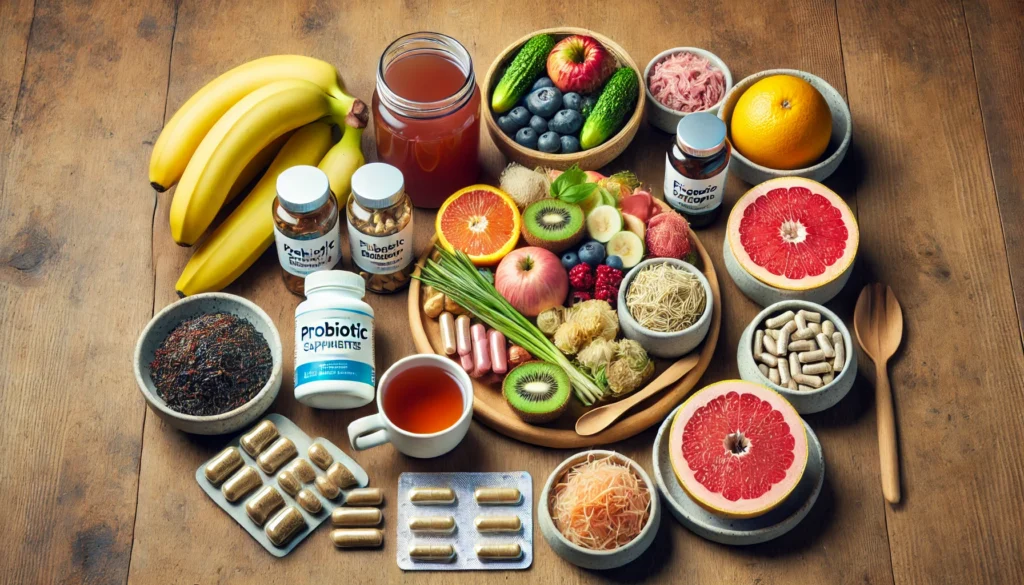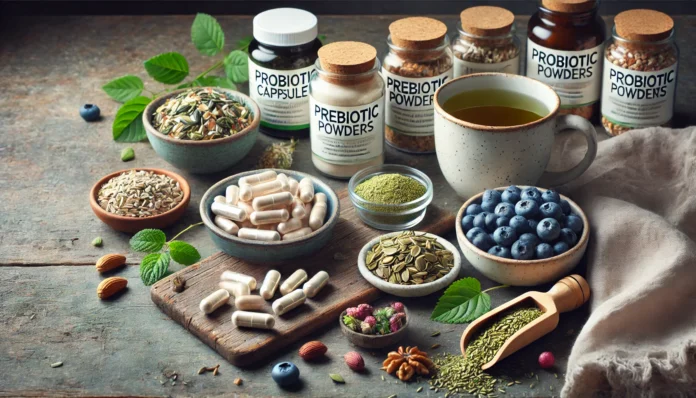Understanding Gut Health and Its Impact on Overall Well-Being
The gut, often referred to as the body’s “second brain,” plays a pivotal role in overall health. Composed of trillions of microorganisms, the gut microbiome influences digestion, immune function, mental well-being, and even metabolic processes. When the gut is balanced, it fosters optimal digestion and nutrient absorption while preventing bloating, inflammation, and gastrointestinal discomfort. Conversely, poor gut health has been linked to chronic conditions such as irritable bowel syndrome (IBS), leaky gut syndrome, and autoimmune disorders. The use of gut health supplements has gained traction as a way to maintain digestive balance, alleviate bloating, and support nutrient absorption. Selecting the best supplements for gut health requires an understanding of their mechanisms, scientific backing, and how they contribute to a thriving microbiome.
You may also like: How to Improve Gut Health Naturally: Science-Backed Tips for a Stronger Microbiome
The Science Behind Gut Supplements: Why They Matter
Gut health supplements serve various functions, from restoring beneficial bacteria to improving enzyme activity for efficient digestion. The most effective supplements for digestion include probiotics, prebiotics, digestive enzymes, and fiber-based formulations. These components work synergistically to enhance intestinal health, reduce bloating, and optimize gut function. For instance, probiotics replenish beneficial bacteria that may be depleted due to stress, antibiotic use, or poor dietary habits. Prebiotics, in turn, act as fuel for these microbes, encouraging their proliferation. Enzymes facilitate the breakdown of macronutrients, ensuring that food is properly digested and nutrients are absorbed efficiently. Furthermore, fiber supplements, particularly those containing psyllium husk or inulin, promote regularity and prevent constipation. A combination of these elements can be found in gut health pills and digestive health supplements, offering comprehensive support for gut microbiota balance and function.
Probiotics: The Foundation of Gut Health Supplements
Probiotics are live microorganisms that support a balanced gut microbiome, with the most common strains belonging to the Lactobacillus and Bifidobacterium genera. Clinical research highlights the efficacy of probiotics in managing IBS, reducing bloating, and improving immune function. Strains such as Lactobacillus rhamnosus GG and Bifidobacterium lactis have demonstrated significant benefits in alleviating digestive distress and modulating gut flora. The best supplements for gut health and bloating often contain multiple probiotic strains to offer diverse benefits. However, probiotic efficacy depends on factors such as strain specificity, dosage, and survivability in the gastrointestinal tract. To maximize benefits, selecting high-quality gut supplements with a diverse probiotic profile and enteric-coated delivery systems ensures that beneficial bacteria reach the intestines intact.
Prebiotics: Essential Fuel for a Thriving Gut Microbiome
Prebiotics are non-digestible fibers that stimulate the growth of beneficial bacteria in the gut. Found naturally in foods like garlic, onions, and chicory root, prebiotics enhance probiotic efficacy by fostering an environment where good bacteria can thrive. Supplements containing prebiotic fibers such as fructooligosaccharides (FOS) and galactooligosaccharides (GOS) have been shown to improve gut health, enhance mineral absorption, and reduce inflammation. When combined with probiotics, prebiotics create a synbiotic effect, promoting a resilient gut microbiome. The best vitamins for gut health often include prebiotics to support long-term digestive wellness and overall immune function.

Digestive Enzymes: Enhancing Nutrient Breakdown and Absorption
Digestive enzymes are crucial for breaking down carbohydrates, proteins, and fats into absorbable nutrients. Enzymes such as amylase, protease, and lipase target specific macronutrients, ensuring that digestion is efficient and preventing gastrointestinal discomfort. Individuals with enzyme deficiencies, such as those with lactose intolerance or pancreatic insufficiency, benefit significantly from digestive pills containing targeted enzymes. Additionally, bromelain (from pineapples) and papain (from papayas) have been studied for their anti-inflammatory and digestive-enhancing properties. The best supplements for gut health and digestion often include a blend of these enzymes to support meal digestion and alleviate post-meal bloating.
Fiber Supplements: The Key to Regularity and Gut Microbiome Balance
Fiber is fundamental to digestive health, yet many individuals fail to meet daily fiber requirements. Insoluble fiber adds bulk to stool and prevents constipation, while soluble fiber feeds beneficial gut bacteria and helps regulate blood sugar levels. Supplements featuring psyllium husk, acacia fiber, or inulin promote gut microbiome balance and overall intestinal health. Moreover, fiber supplements for digestion contribute to gut barrier integrity, reducing the risk of leaky gut syndrome. Incorporating fiber-based gut health tablets into a daily routine can significantly enhance digestive function and promote long-term gastrointestinal health.
The Role of Gut Health Supplements in Mental and Cognitive Well-Being
The gut-brain axis—a bidirectional communication system between the gut and the central nervous system—plays a significant role in mental health. Research suggests that an imbalanced gut microbiome may contribute to anxiety, depression, and cognitive dysfunction. Probiotic and prebiotic supplements have been shown to modulate neurotransmitter activity, reduce systemic inflammation, and support mental clarity. Certain strains, such as Lactobacillus helveticus and Bifidobacterium longum, have demonstrated efficacy in reducing stress-induced cortisol levels and improving mood. As a result, gut health supplements not only enhance digestion but also support emotional resilience and cognitive function.
Choosing the Best Supplements for Gut Health and Bloating
Selecting high-quality digestive health supplements requires careful consideration of ingredient transparency, formulation integrity, and third-party testing. The best supplements for gut health prioritize clinically studied strains, optimal dosages, and bioavailability-enhancing delivery methods. Furthermore, avoiding artificial additives, fillers, and unnecessary binders ensures that supplements provide pure, beneficial ingredients. Brands that undergo rigorous quality testing and adhere to Good Manufacturing Practices (GMP) standards offer superior efficacy and safety. By choosing well-formulated gut health supplements, individuals can experience enhanced digestion, reduced bloating, and improved overall well-being.

Frequently Asked Questions About Gut Health Supplements
What are the key differences between probiotics and prebiotics, and how do they work together?
Probiotics and prebiotics play distinct but complementary roles in gut health. Probiotics are live microorganisms, primarily beneficial bacteria, that support the digestive system by maintaining a balanced gut microbiome. They help replenish good bacteria that may be depleted due to factors such as stress, poor diet, or antibiotic use. Prebiotics, on the other hand, are types of fiber that feed and stimulate the growth of these beneficial bacteria. When taken together, they create a symbiotic effect, improving the effectiveness of gut health supplements and promoting long-term intestinal balance.
How can gut supplements support mental health and cognitive function?
The gut-brain axis is a bidirectional communication system that links the digestive system with the brain, meaning that gut health has a significant impact on mental well-being. Research suggests that certain probiotics, such as Lactobacillus helveticus and Bifidobacterium longum, can reduce stress and anxiety by modulating neurotransmitter activity. Additionally, a healthy gut microbiome produces short-chain fatty acids that support brain function and reduce inflammation. By incorporating gut health pills into a daily routine, individuals may experience improved mood, reduced stress, and enhanced cognitive clarity. The best supplements for gut health often contain targeted strains that directly support both digestion and emotional resilience.
Are there specific gut health supplements that help with bloating?
Yes, some gut health supplements are particularly effective for reducing bloating and discomfort. Digestive enzymes help break down complex foods, preventing fermentation in the gut that can lead to gas buildup. Probiotics like Lactobacillus plantarum have been shown to reduce bloating by balancing gut bacteria and improving intestinal transit. Additionally, prebiotics such as inulin promote a healthy gut environment by encouraging the growth of beneficial bacteria. When selecting the best supplements for gut health and bloating, look for formulations that combine probiotics, digestive enzymes, and soothing herbal ingredients like peppermint or ginger.
Can gut health supplements improve immune function?
The majority of the body’s immune cells reside in the gut, making intestinal health supplements essential for immune resilience. Probiotics strengthen the gut barrier, preventing harmful pathogens from entering the bloodstream. Prebiotic fibers fuel beneficial bacteria, which in turn produce compounds that regulate immune responses. Certain strains, such as Lactobacillus casei, have been linked to enhanced production of natural killer cells, which help fight infections. Regularly taking supplements to improve gut health can support the immune system by reducing inflammation and promoting a balanced microbial environment. A well-supported immune system contributes to overall wellness and resilience against illnesses.
How do digestive health supplements aid in nutrient absorption?
Optimal digestion is crucial for absorbing essential nutrients, and digestive pills can play a key role in enhancing this process. Digestive enzymes such as amylase, protease, and lipase break down carbohydrates, proteins, and fats, respectively, ensuring efficient nutrient uptake. Probiotics also contribute by maintaining a healthy gut lining, which allows for better absorption of vitamins and minerals. In cases of gut dysbiosis, nutrient absorption may be compromised, leading to deficiencies in key nutrients like vitamin B12 and magnesium. The best vitamins for gut health often include a combination of probiotics and digestive enzymes to maximize nutrient bioavailability and overall metabolic efficiency.
What is the role of fiber in gut health, and should I take fiber supplements?
Fiber is essential for digestive health, acting as both a regulator of bowel movements and a food source for beneficial gut bacteria. Soluble fiber, found in ingredients like psyllium husk and acacia fiber, helps maintain regularity and prevent constipation. Insoluble fiber adds bulk to stool, aiding in smooth elimination and reducing the risk of digestive discomfort. Many people do not consume enough fiber through diet alone, making fiber-rich gut health tablets a practical solution. By incorporating fiber-based digestive health supplements, individuals can promote a well-balanced gut microbiome while improving digestive efficiency and long-term intestinal function.
Are gut health supplements safe for long-term use?
Most high-quality gut supplements are safe for long-term use, especially when taken at recommended dosages. Probiotics and prebiotics are naturally occurring in many foods and can be safely supplemented to maintain digestive balance. However, digestive enzyme supplements should be used mindfully, as excessive enzyme intake may lead to dependency over time. It is also important to choose supplements free from artificial additives and unnecessary fillers, as these can negatively impact gut health. Consulting with a healthcare provider before making long-term dietary changes ensures that the best supplements for gut health are selected based on individual needs.
How do I choose the right gut health supplements for my specific needs?
Selecting the best supplements for gut health depends on individual digestive concerns and health goals. Those struggling with bloating may benefit from a combination of probiotics and digestive enzymes, while individuals with irregular bowel movements might require fiber-rich formulations. Checking for clinically studied strains, transparent ingredient sourcing, and third-party testing ensures supplement quality and efficacy. Additionally, choosing supplements that are allergen-free and suited to dietary preferences, such as vegan or gluten-free options, can improve compliance and effectiveness. A well-rounded approach to digestive health involves combining gut health supplements with a nutrient-dense diet and healthy lifestyle habits.
Can lifestyle and dietary choices enhance the effects of gut health supplements?
While gut supplements are highly beneficial, they work best when combined with supportive lifestyle and dietary choices. A diet rich in diverse, fiber-filled plant foods encourages the growth of beneficial gut bacteria, enhancing the effects of probiotics. Reducing processed foods, artificial sweeteners, and excessive alcohol intake minimizes disruptions to gut microbiota. Regular exercise has been shown to positively impact gut diversity, further strengthening digestive resilience. Staying hydrated and managing stress through mindfulness practices also contributes to better gut health. By integrating these habits with the best supplements for gut health, individuals can achieve a more balanced and robust digestive system.

Conclusion: Optimizing Gut Health for Long-Term Wellness
The importance of gut health extends beyond digestion, influencing immunity, mental clarity, and overall vitality. Incorporating high-quality supplements for digestion, including probiotics, prebiotics, digestive enzymes, and fiber, supports a balanced microbiome and alleviates gastrointestinal discomfort. With growing scientific evidence underscoring the gut’s role in systemic health, prioritizing intestinal well-being through expert-backed supplements is a powerful step toward optimal wellness. Whether seeking relief from bloating, improved nutrient absorption, or enhanced mental health, selecting the best supplements for gut health provides a comprehensive approach to holistic well-being.
gut microbiome balance, digestive wellness tips, natural gut support, probiotics for digestion, prebiotics for gut health, enzyme supplements for digestion, intestinal flora restoration, microbiome-friendly diet, digestive system care, holistic gut health, leaky gut remedies, bloating relief solutions, gut-friendly nutrition, best foods for gut bacteria, immune system and gut health, fermented foods benefits, gut health and mental clarity, anti-inflammatory gut diet, fiber for digestive health, healthy digestion habits
Further Reading:
9 Supplements for Optimal Gut Health, According to a Dietitian
Best Supplements for Gut Health: Top Picks for Digestive Wellness
Gut Health Supplements: Top Picks to Improve Your Digestive Wellbeing
Disclaimer
The information contained in this article is provided for general informational purposes only and is not intended to serve as medical, legal, or professional advice. While Health11News strives to present accurate, up-to-date, and reliable content, no warranty or guarantee, expressed or implied, is made regarding the completeness, accuracy, or adequacy of the information provided. Readers are strongly advised to seek the guidance of a qualified healthcare provider or other relevant professionals before acting on any information contained in this article. Health11News, its authors, editors, and contributors expressly disclaim any liability for any damages, losses, or consequences arising directly or indirectly from the use, interpretation, or reliance on any information presented herein. The views and opinions expressed in this article are those of the author(s) and do not necessarily reflect the official policies or positions of Health11News.


